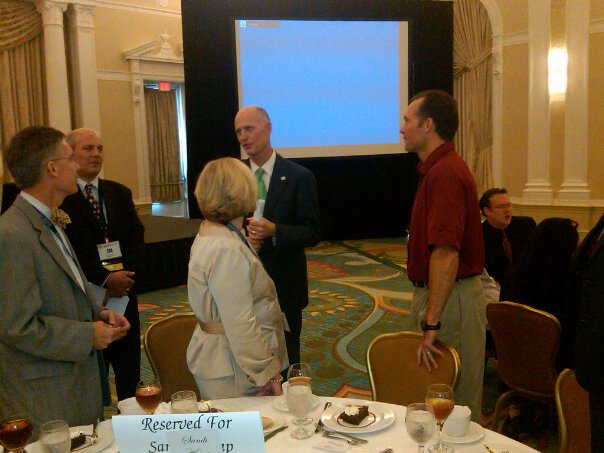
Governor Rick Scott speaks to journalists at the 2011 Florida Society of News Editors annual meeting held in St. Petersburg in July. (Photo by Mc Nelly Torres)
By Ralph De La Cruz
Florida Center for Investigative Reporting
Many of the quarrels between Florida Gov. Rick Scott and various groups in the first seven months have been publicly – even legally – documented.
But there has been one conflict that has been going on quietly, in the background of the news.
That’s been the quarrel between Scott and the press.
Scott didn’t waste much time sending the message that he would be openly challenging the press. Some reporters were kicked out of a post-inauguration reception held in the Capitol to which all legislators were invited.
And things only worsened from there. Public records requests were stalled or rejected. Or media outlets were charged a governor’s ransom to get records. On his website, Crowley Political Report, former Palm Beach Post political editor Brian Crowley compared the cost of getting all of Sarah Palin’s e-mails for two years versus getting a week’s worth of e-mails belonging to Gov. Scott’s communications director.
Scott’s office charged $784.84 for 1,100 e-mails. Alaska charged about $60 less ($725.97) for 24,000 pages of e-mails.
And then there was the public relations disaster that was Scott’s signing of the state budget – in which his office kicked out citizens wearing Democrat T-shirts.
This was going on in a state that traditionally had the most open public meeting and records laws in the country.
Well, after recently bringing in politically experienced and connected Steve McNamara as his chief of staff, Scott seems to have developed some flexibility. It’s as if McNamara is a master of political Pilates.
On Tuesday, rumors began to circulate and by Thursday it was official: Scott’s office is reducing the fees for searching and providing records.
The St. Petersburg Times characterized it as a “rethinking” of the policy. The Palm Beach Post called it “backing down.”
The New Times’ blog, The Pulp, put it this way: “They’re not backtracking on charging people, but they’re having a sale on getting information.”
Defending the fees earlier this month at the annual meeting of the Florida Society of News Editors, Scott said, “Part of my job is to make sure I don’t waste taxpayer money.”
So is ours, governor.
